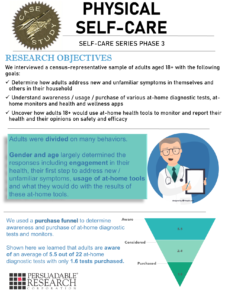Physical Self-Care Case Study - Persuadable Research Corporation
Background
In January of 2024, we set out to explore various aspects of self-care. Our first study was to determine what self-care meant to respondents. In April 2024, we took a deeper dive into the area of mental self-care. For August 2024, we planned to probe into attitudes and awareness of physical self-care. We started by hypothesizing what someone would do when experiencing a new or unknown symptom. This led us to at-home diagnostic testing, monitors, and apps. Before we knew it, we found ourselves in the same dilemma as many of our clients– how to answer so many questions in such a short survey! Since our initial goal in this series was to look for opportunities to share insights with our clients, we decided to expand the scope of this study. This survey is a bit longer than a traditional Rocket Powered Insights Study but, in the end, the insights we uncovered were worth the extra time and costs!
Research Objectives
- We interviewed a census-representative sample of adults aged 18+ with the following goals:
- Determine how adults address new and unfamiliar symptoms in themselves and others in their household
- Understand awareness and usage/purchase of various at-home diagnostic tests
- Understand awareness and usage/purchase of various at-home monitors
- Understand awareness and awareness/usage of various health and wellness apps
- How adults 18+ use / would use at-home health tools to monitor and report their health
- Understand opinions about safety and efficacy of at-home health monitors / tests
Insights
We cast a very wide net in this study. The insights are almost impossible to summarize in just a few points. The report is available to download below.
- Adults were divided on many behaviors. Gender and age largely determined the responses.
- Millennials appear to be more engaged in their health than any other generation purchasing more at-home diagnostic tests, using more health/wellness apps & first consulting their doctor to address new/unfamiliar symptoms.
- Boomers are more likely to have purchased an at-home monitor and are most comfortable sharing those results with their doctor.
- We used a purchase funnel technique to determine awareness and purchase of at-home diagnostic tests and monitors.
Self-Care Series
Send download link to:



